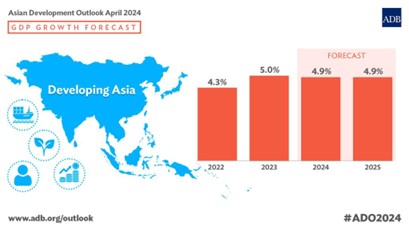Developing economies in Asia and the Pacific are forecast to expand by 4.9% on average this year as the region continues its resilient growth amid robust domestic demand, improving semiconductor exports, and recovering tourism.
Growth will continue at the same rate next year, according to the Asian Development Outlook (ADO) April 2024, released today by the Asian Development Bank (ADB). Inflation is expected to moderate in 2024 and 2025, after being pushed up by higher food prices in many economies over the past 2 years.
Stronger growth in South and Southeast Asia—fueled by both domestic demand and exports—is offsetting a slowdown in the People’s Republic of China (PRC) caused by weakness in the property market and subdued consumption. India is expected to remain a major growth engine in Asia and the Pacific, with a 7.0% expansion this year and 7.2% next year. The PRC’s growth is forecast to slow to 4.8% this year and 4.5% next year, from 5.2% last year.
“We see strong, stable growth for the majority of economies in developing Asia this year and next,” said ADB Chief Economist Albert Park. “Consumer confidence is improving, and investment is resilient overall. External demand also appears to be turning a corner, particularly with regard to semiconductors.”
Policy makers should remain vigilant, however, as there are a number of risks. These include supply chain disruptions, uncertainty about US monetary policy, the effects of extreme weather, and further property market weakness in the PRC.
Inflation in developing Asia and the Pacific is expected to decline to 3.2% this year and 3.0% next year, as global price pressures ease and as monetary policy remains tight in many economies. However, for the region excluding the PRC, inflation is still higher than before the COVID-19 pandemic.
Rice prices have contributed to higher food inflation, especially for import-reliant economies. Prices for rice are likely to stay elevated this year, according to ADO April 2024. Reasons include crop losses due to adverse weather and India’s restrictions on rice exports. Increased global shipping costs, due to attacks against ships in the Red Sea and drought in the Panama Canal, may also add to inflation in Asia, according to the report.
To tackle surging rice prices and protect food security, governments can give targeted subsidies to vulnerable populations and enhance market transparency and monitoring to prevent price manipulation and hoarding. In the medium to longer term, policy should focus on establishing strategic rice reserves to stabilize prices, promoting sustainable farming and crop diversification, and investing in agricultural technology and infrastructure to raise productivity. Regional cooperation can also help manage rice prices and their impact, the report says.
ADB is committed to achieving a prosperous, inclusive, resilient, and sustainable Asia and the Pacific, while sustaining its efforts to eradicate extreme poverty. Established in 1966, it is owned by 68 members—49 from the region.

